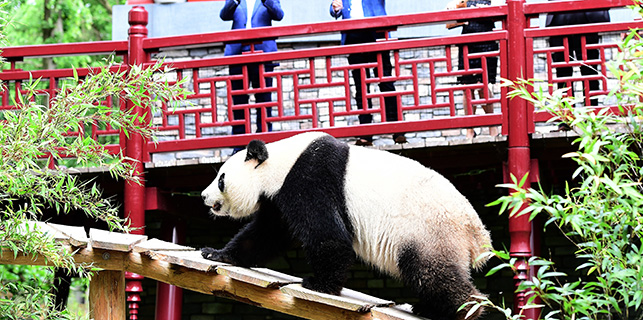Listed realty companies face uphill task on curbs
 |
|
A prospective homebuyer enquires about a new project at a property event in Hebei's Handan. Some listed small and mid-sized real estate companies have been facing difficulties in home sales in third-and fourth-tier cities after stricter norms took effect last month. [Photo provided to China Daily] |
Sales, financing become big challenges as stiffer norms begin to pinch
China's listed real estate enterprises are likely to face big challenges in both sales and financing this year due to stricter measures, according to a report of the China Index Academy.
More companies have turned to traditional financing channels, which include bank loans, medium-term notes and trusts, instead of corporate bonds, according to the report.
An increasing number of real estate companies are looking at overseas financing channels to prevent capital flows from drying up, the report said.
It also revealed overseas financing has grown 308 percent year-on-year and 169 percent than the previous quarter in the first quarter of this year.
Next year will likely pose higher capital risk to some listed small and mid-sized real estate companies, given their current difficulty in selling homes in their key markets like third-and fourth-tier cities, the report stated. Meanwhile, the property market in major cities continued to stabilize after authorities implemented a string of measures to contain prices.
Of the 70 large and medium-sized cities surveyed by the National Bureau of Statistics, 30 cities witnessed slower price rises in April, up from 24 cities in March.
Since October last year, the Chinese government has implemented a slew of measures to cool the runaway rise in home prices. Such measures included restrictions on home purchases and increase in minimum down payment requirements.
Ouyang Jie, senior vice-president of HongKong-listed real estate enterprise Future Holdings, said sales will nevertheless likely rise in the second half of 2017, but in single-digit terms, due to a possible slight growth in housing prices, even though the pace of growth in real estate supply has slowed.
He, however, said the government's latest round of regulation will cause a slump in real estate sales and a drop in the average home price in the 70 cities.
"Third-and fourth-tier cities, where the housing prices grew too fast, will also be regulated soon," he said.
Ouyang also said that real estate companies should increase their capital reserves by promoting financing, reducing participation in buybacks and stock splits, and by adjusting their investment patterns.
Some leading property companies have been actively exploring alternative ways of guarding themselves against the risk of downward pressure.
For instance, Vanke, the country's largest property developer by market value, has quickened its Internet Plus strategy. An affiliate company of Vanke joined hands with a number of internet-based service providers (apps) such as ofo, Flower Plus and Meituan, to jointly explore the consumption potential of residents of Vanke projects.
"There are different phases in our collaboration with internet firms, starting from introducing clients to online platforms and later finding new marketing channels via big data," said Liu Xiao, Vanke's vice-president.
According to the academy's report, the average gross assets of the top 10 Shanghai- and Shenzhen-listed Chinese real estate companies reached 323.3 billion yuan ($46.9 billion) by the end of 2016, 6.34 times that in 2015. The average net profit grew 7.32 times to 9.58 billion yuan in the same period.









